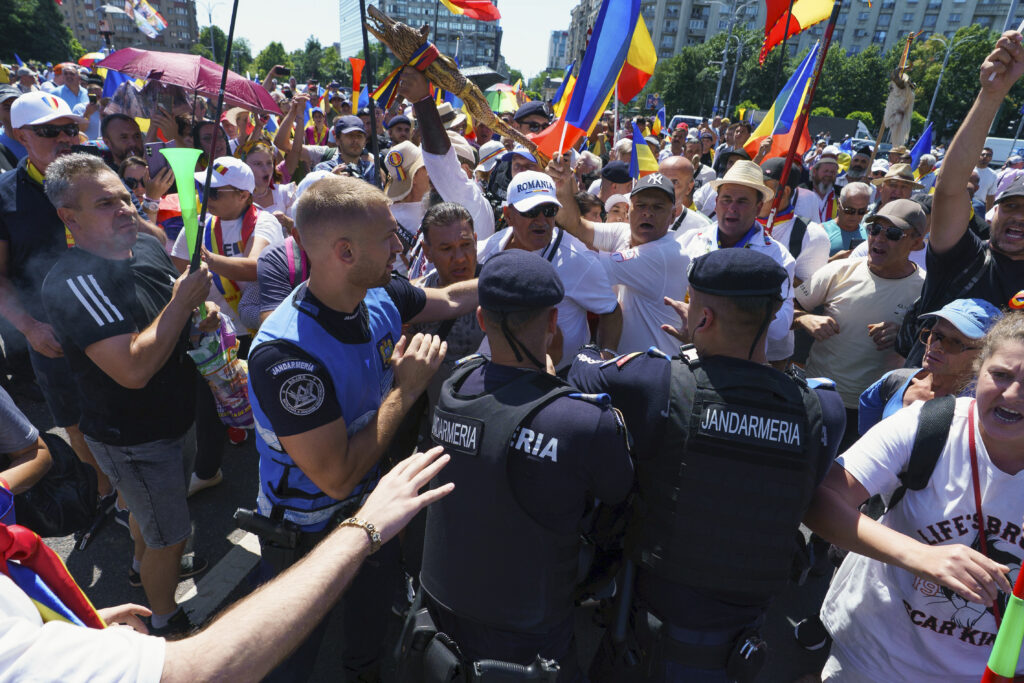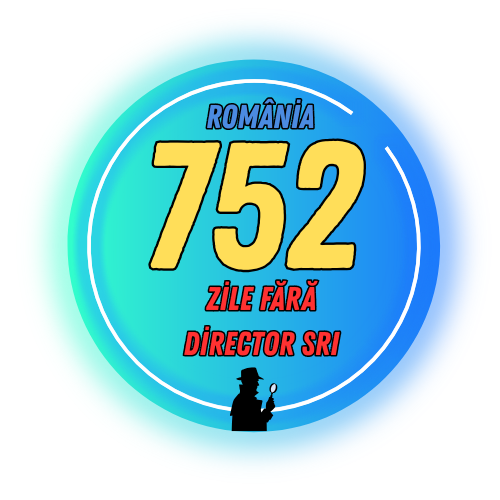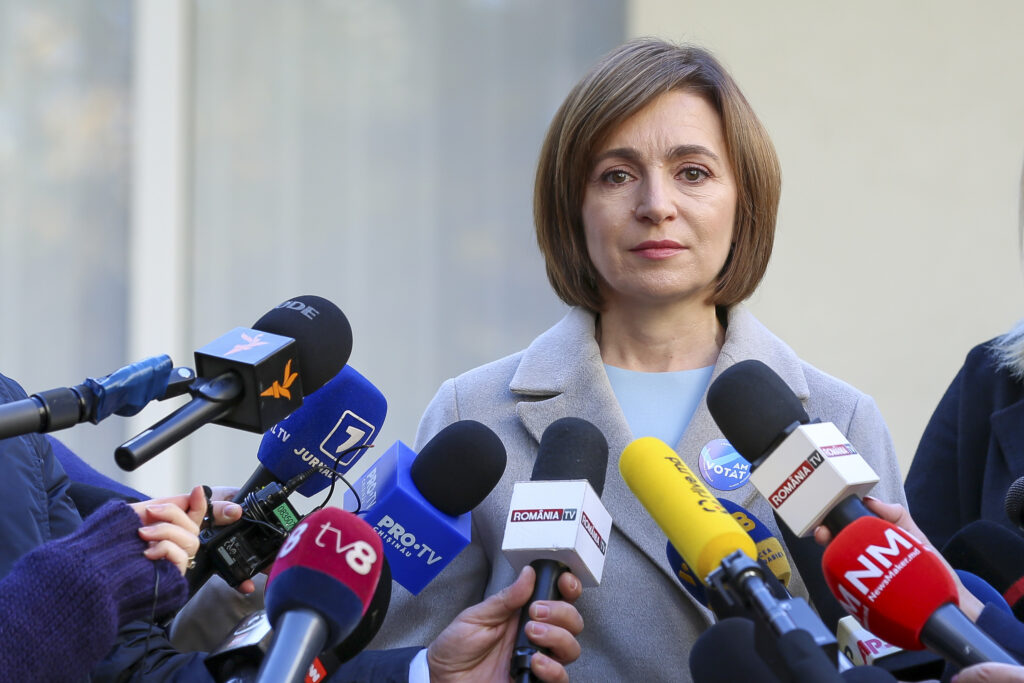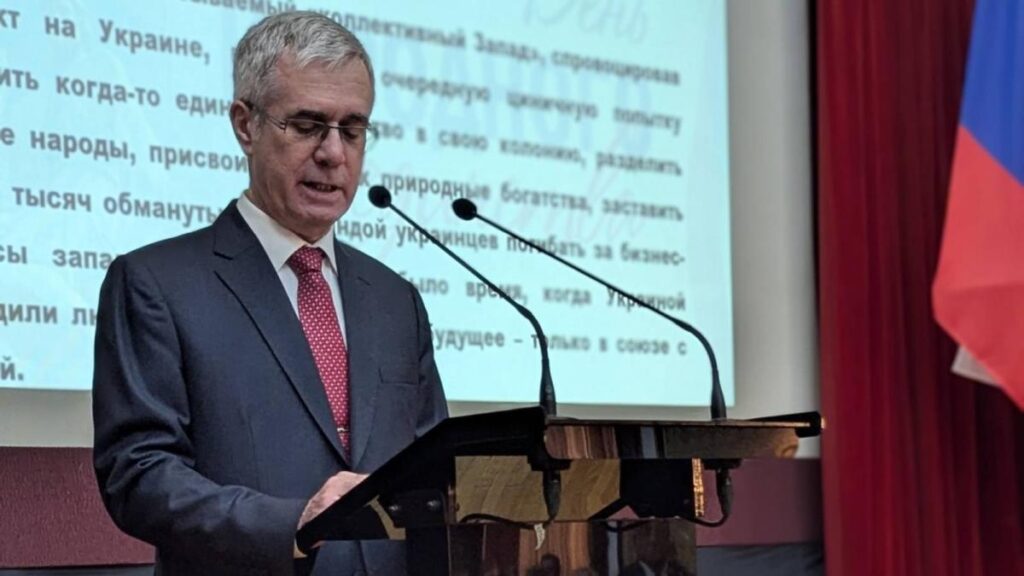The speed with which the heat conquered the city, the few cars on the streets, and the casually dressed passersby hurrying towards shaded places heralded a quiet Sunday afternoon in a Bucharest asleep in the scorching heat of late July.
Immediately after lunch, a gathering of a few hundred people demanding “the return of round 2” entered the roadway in Victory Square, and a few more violent protesters clashed with the gendarmes.
Meanwhile, two trucks blocked the A1 highway on the entrance to Bucharest, and drivers climbed onto the cabins, waving tricolor flags, live streaming on TikTok, and chanting the name of Călin Georgescu, while dozens of cars, including ambulances, were whipped by the scorching rays of the sun.
George Simion posted a cryptic message in support of the protest in Victory Square, he, as usual, being far away in Cyprus, where he strategically arranged a schedule combining his promotional campaign with relaxation.
“I risked my neck a few times… this year, and thank God there were no incidents – they were just waiting to arrest me when I organized the big protests. It's hard! All my colleagues were out there, on the streets. It's this kind of heat… hotter than in Cyprus. People move slowly, but we have to get them moving…,” confessed the AUR leader, in a discussion with a group of Romanians at a table on a terrace.
What happened on Sunday was a new chapter in a series of protests, regularly held, following the same pattern, with more or fewer participants, used more to fuel TikTok accounts supporting and promoting the Kremlin's discourse rather than achieving any political goal.

NATO Concerned About Russia's Hybrid Attacks on Romania
Two days before the protest in Victory Square and the highway blockade, the North Atlantic Treaty Organization (NATO) released a statement announcing that the actions of Russia's military intelligence service, GRU, conducting hybrid warfare, are being monitored, and the hostile involvement of Russian soldiers in several countries, including Romania, is known.
“We strongly condemn Russia's malicious cyber activities, which pose a threat to the Allies' security. We stand in solidarity and acknowledge that Estonia, France, the United Kingdom, and the United States have recently attributed malicious cyber activities to Russia's military intelligence service (GRU) targeting multiple NATO allies and Ukraine,” the NATO report states.
“We recall that in 2024, Germany and the Czech Republic individually attributed activities to the APT 28 group, sponsored by the GRU. We also note with concern that the same hostile actor has targeted a range of national government institutions, critical infrastructure operators, and other entities within the Alliance, including Romania,” the document further states.

The APT 28 group , which has also operated under the names Fancy Bear and Pawn Storm, is a dynamic structure in cyber warfare, created by the GRU in Russia, belonging to Military Unit 26.165, carrying out major cyber espionage operations in Europe and beyond.
The direct naming in an official statement of an important structure created by Russia to attack NATO member states sends a message to Vladimir Putin that there is information within the alliance about Russia's activities and that they will receive a response.
Romania's Reaction
“… speaking of Russian interference, I want to welcome the viewpoints that have emerged… where NATO and the European Union have explicitly spoken about Russian influence on European countries and specifically about its influence in Romania and in Romania's elections. I think this is an important point to understand what has happened in our country over the past year,” stated President Nicușor Dan, in a press conference held alongside Friedrich Merz, the Chancellor of Germany.
Official positions expressed internationally regarding the events that led to the cancellation of Romania's presidential elections show that the situation has worried and continues to worry both NATO and the European Union.
Attempts by foreign state forces to interfere in our country's elections in recent months were condemned for the first time in official statements by NATO and the European Union. NATO, the EU, and the UK confirm that Russia is conducting cyber aggression, manipulation, and disinformation in European countries, including Romania, particularly during electoral campaigns.
Nicușor Dan, President of Romania
On the other hand, in Bucharest, at the level of public opinion, dissatisfaction continues regarding the lack of reaction and explanations from the authorities regarding the crisis created.
By not initiating an official investigation into how Russia's interference occurred, it is unclear who acted, who the responsible parties and accomplices in the country are that caused the electoral process to derail, further delaying the closure of a major vulnerability and inviting the initiation of new hostile actions.
“There are two components,” of the hybrid warfare directed against Romania, said Nicușor Dan in the press conference.
“One is the classic cyber action, attacking structures, and for this issue, we have reports especially from STS about such attacks. The second component, much more related to the democratic process, is influencing through fake news and an entire process of manipulation and disinformation taking place within European countries, especially those closer to the eastern border of the European Union.
And here, as you know, we have had a long debate in the country and we will come up with a report within a reasonable timeframe. And we discussed cooperating with the aim of defending ourselves against each of these two types of attacks,” the President of Romania added.
Laboratories for Inventing Absurdities
Such a report is urgent and necessary not only to begin rebuilding Romania's defense system, seriously shaken by last year's events but also because Moldova depends largely on the support provided by Bucharest in terms of protection against Russian attacks.

“The laboratories for inventing absurdities have started running at full speed. In the coming period, lies will flow abundantly from the Kremlin's trumpets just to seize Moldova and hand it over to the control of foreign interests.
Recently, those who kill children by intentionally dropping bombs over residential buildings want to sow panic among Moldovans by claiming that I would want war or violate the country's neutrality,” announced Maia Sandu, the President of Moldova, indicating that Kremlin attacks have begun and target the parliamentary elections on September 28, which could once again bring Chisinau under Moscow's control.
Another significant signal indicating that Russia will continue to attack Romania and Moldova through all available means was given these days by Vladimir Lipaev, the Russian ambassador to Bucharest.
“The West considers Romania as a launchpad for intervention in the conflict in Ukraine. This represents a threat to regional security…,” stated Russian diplomat in an interview with the publication “Izvestia”, controlled by the Kremlin.

“The West… increasingly attempts to intervene in the conflict (n.a. Ukraine) hoping to change its course by escalating it. The use of the territories of member states [NATO], those closest to Russia, including Romania, is considered one of the tools of such interference. For this reason, Romania's militarization is in full swing…,” Ambassador Lipaev further stated for the Russian publication.
With political tensions on the rise due to budget deficit reduction measures, without a director at the SRI for two years, with the Kremlin's pressure on Moldova intensifying as the parliamentary elections approach, the new leadership of Romania must accelerate reforms and changes in the security and defense system to address immediate challenges as a result of the hybrid warfare waged by Russia in Europe.

